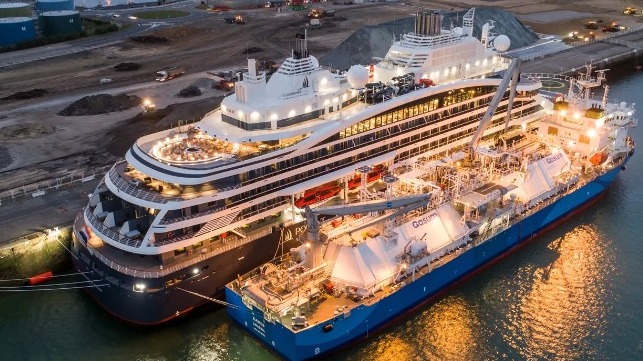First LNG Bunkering Completed at Le Havre for Expedition Cruise Ship

The first LNG bunker operation in the port of Le Havre, France was completed last week. It also marked the expansion of Gasum’s network to France. The energy company highlighted the expansion noting that Le Havre is the second-largest commercial port and the largest container port in France.
Gasum delivered the LNG to the French luxury cruise operator La Compagnie du PONANT for the company’s newly built polar explorer cruise ship, Le Commandant Charcot. The bunkering operations were conducted on September 24 during the cruise ship’s inaugural call to a French port.
Le Commandant Charcot, named after the renowned French polar scientist and explorer Jean-Baptiste Charcot, is the first hybrid-electric polar exploration ship powered by LNG. Built by VARD in Norway, the vessel was delivered at the end of July 2021. This unique polar exploration vessel is the latest addition to PONANT’s fleet and is set to sail the Arctic and Antarctic regions. During her first voyages, the ship reached the Geographic North Pole for the first time on September 6, using natural gas throughout its journey.
"We have been working on this natural gas-powered polar exploration ship project for six years,” said Hervé Gastinel, CEO of PONANT. They noted that it was the second Liquefied Natural Gas bunkering operation carried out with Gasum since the delivery of the ship on July 29. “These LNG bunkering operations represent the culmination of several years of analysis, engineering, and testing to perform these operations safely and with maximum efficiency.”
Le Commandant Charcot is the first LNG-powered exploration cruise ship and also the first passenger ship equipped with high-pressure membrane LNG tanks offering up to two months of autonomy on natural gas, which Ponant notes creates greater flexibility in its bunkering and operation.
Using LNG was considered an important factor for the ship’s operation. Le Commandant Charcot will be operating in fragile environments, such as the waters of the North Pole and Antarctica. Both regions have been under intense pressure to reduce and eliminate harmful emissions from their environments.

that matters most
Get the latest maritime news delivered to your inbox daily.
“This delivery marks an important step in our cooperation with PONANT and I am proud to support PONANT in reducing their emissions. At the same time, we expanded our delivery network to a port as significant as Le Havre. Our services for maritime operators all over Europe are becoming even more relevant, in the light of the requirements of the EU’s recent Fit for 55 -climate package proposal,” says Jacob Granqvist, Vice President of Gasum’s Maritime.
So far, while the cruise industry has become among the adopters for LNG-fuel technology, it has been limited to large cruise ships, in part due to the lack of a fully developed global LNG fuel supply network. Carnival Corporation has been at the forefront of the industry’s efforts introducing the first cruise ship to operate full time on LNG, the AIDANova in 2018. The platform has also become the basis for Costa Cruises’ first LNG cruise ship introduced in the Mediterranean and P&O Cruises' first British LNG-fueled cruise ship. Recently, Carnival Cruise Line introduced the next LNG cruise ship, the first in North America, the Mardi Gras. Each of the brands is building additional LNG cruise ships and recently Fincantieri cut steel for Princess Cruises’ first LNG-fueled cruise ship. Both Royal Caribbean International and MSC Cruises are also building LNG-fueled cruise ships.
